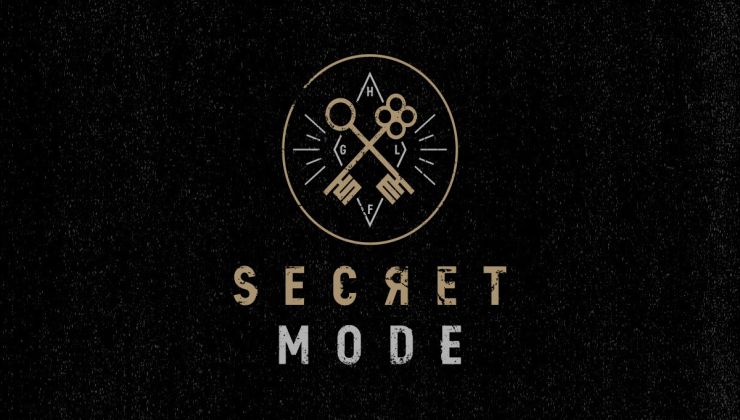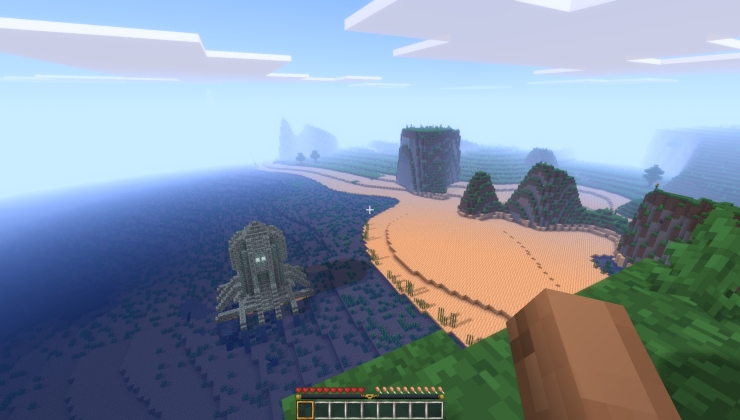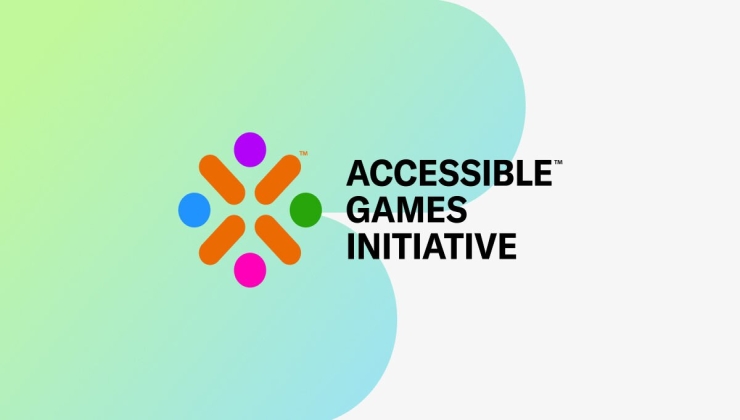AI this, AI that - you can't go anywhere without something trying to force AI on you. Usually a company trying to get you to buy into what they've wasted billions on. So indie devs have begun fighting back with their No Gen AI Seal.
There's an increasing amount of developers using some form of AI generation from small developers to the AAA lot that I keep spotting recently, and so you might want to pick some out that are actually 100% human made. While Steam (being the easiest example) does have newer rules around AI disclosures, these are buried at the bottom of store pages and can be pretty easy to miss.
One way would be for developers to put a big badge on a store page to show off their human side, and that's exactly what some indie developers have chosen to start doing.
Announced by Alex Kanaris-Sotiriou of Polygon Treehouse (Mythwrecked & Röki) on Bluesky, they've launched the free to use No Gen AI Seal available via the Polygon Treehouse website. Writing about why it can be problematic the website states:
Generative AI is a technology that can create pictures, movies, audio (music or voice action) and writing using artificial intelligence. The issue is that these generative technologies are trained on existing works by human artists who have not given their permission, or been compensated, for their work being utilised. Essentially their work has been stolen.
The seal looks like this:

You can see it on the store pages for the likes of Mythwrecked: Ambrosia Island, Rosewater and more in the sidebar.
Perhaps in future we might see stores add specific filters to select "No Gen AI". It's clearly a growing market though, which is what pushed Valve to add their new disclosure rules, and we're likely to see a whole lot more games use generative AI as time goes on. It's going to get more messy and confusing for consumers as time goes on, at least until the ridiculous bubble finally bursts.
There's a lot of silliness going around like how Phil Spencer of Microsoft Gaming thinks generative AI will help game preservation and the Take-Two CEO believing AI will increase employment and productivity. Going by the latest 2025 GDC Survey there's clearly a lot of developers concerned about it and plenty working in companies currently using it.
Most of the AI models I am aware of used scrapers to collect openly accessible texts/images etc. If that's even illegal under current law is a different question.Legality aside, in my opinion this is only ethical if openly accessible means public domain or otherwise permissively licenced work.
In any case, I'll just do my best to avoid using this tech until these important questions are addressed to my satisfaction. And if any future laws or regulations make it harder to make money off of LLM tech or off products created using them, I can live with that. My employer won't be happy, but I can live with that too.
Legality aside, in my opinion this is only ethical if openly accessible means public domain or otherwise permissively licenced work.
There was at least one proof-of-concept image generation model that used only CC-0/Public Domain images for training. It was pretty good at classic art, from what I could see (which makes sense). But alas, while there is plenty of OSS code around to train coding-oriented models with, text and art is a different affair. People aren't nearly as liberal with placing that under free licenses.
For most of these models, "openly accessible" meant that they downloaded whatever was NOT behind a paywall or login barriers, and trained their models with that. Downloading unprotected assets from the internet is not considered a copyright violation, so legally that's fine until this point. Whether redistributing models trained on such data is, is currently what the lawyers argue about. The sticking point is that there is no trace of the original data in the weights, so arguing copyright violation is harder than some people seem to think.
The ethic side is a different affair, of course. The problem is that different people have different ethical standards, so that's why we urgently need legal clarification and/or new regulations. Requiring individual consent is prohibitively impractical (unless we want to strangulate AI model creation by requiring them to get hundreds of millions of signatures from content creators first). That's why I hope for some sort of taxation of commercial models (while keeping open source models exempt). But that's just me. Opinions of what should be done are all over the place.
Last edited by Kimyrielle on 24 Feb 2025 at 9:15 pm UTC
It's funny -- if not ironic -- because copyright originally came about to protect the public domain's rights to access the material, not the creator's ownership of their IP (i.e., copyright means "the right to copy"). In many ways, the FOSS and copyleft movements are a direct result of the for-profit sector's corruption of copyright's original purpose.
Last edited by Caldathras on 24 Feb 2025 at 10:03 pm UTC
Ah, yes, the "AI bad" bandwagon.You're assuming that the resources will still exist to maintain this corporate boondoggle after that length of time.
We'll see how that is going in 5-10 years
I have no problem with indie devs using this seal.
Personally, I want nothing to do with this LLM that they are falsely spinning as AI. It is not true AI and never will be. I consider it just a costly waste of energy. But, that's my choice and definitely doesn't have to be anyone else's.
Last edited by Caldathras on 24 Feb 2025 at 10:06 pm UTC
You're assuming that the resources will still exist to maintain this corporate boondoggle after that length of time.Small, local LLMs aren't going away. LLMs aren't likely to get much better, but they certainly aren't going away, however you feel about it.
For most of these models, "openly accessible" meant that they downloaded whatever was NOT behind a paywall or login barriers, and trained their models with that. Downloading unprotected assets from the internet is not considered a copyright violation, so legally that's fine until this point.I would like a great big "citation needed" on that, not to forget "under which jurisdiction?". Let’s take a look at the EU for instance (emphasis mine):
https://op.europa.eu/en/publication-detail/-/publication/8ca54353-87f9-11ec-8c40-01aa75ed71a1/language-en
The use of works available on the Internet usually requires prior authorisation of the copyright owner. That applies to pictures, marketing videos, clips, articles published in newspapers, corporate brochures, website design, etc. The mere fact that a work is available digitally does not mean copyright law does not protect it.That sounds rather contrary to your assertion.
Quite to the contrary, when it comes to benefiting from copyright protection, the manner of fixation is irrelevant and often fixation is not even required at all[29] . Downloading content from any website is, in fact, making a copy of that content, which can be compared to making copies of a book in a library. Such action may therefore constitute a copyright infringement.
Requiring individual consent is prohibitively impractical (unless we want to strangulate AI model creation by requiring them to get hundreds of millions of signatures from content creators first).I doubt they would need to engage hundreds of millions of content creators either way. In many cases, just getting approval from the right holders of vast collections of works would be enough to cover them legally – hopefully said right holders would obtain necessary consents from the original creators at the individual level if necessary, but that already greatly dilutes the burden on the model makers. We can think of things like music labels, publishing houses and newspapers, for example, where one legal entity is able to license a considerable amount of materials at once or in sizeable chunks.
It’s not like no one would accept given the chance. I’ve seen plenty of job ads asking for people to produce voice samples and chat bot queries, or manually validate and correct LLM responses and other "AI" output to improve quality. These companies are paying people to provide and improve the training materials for them, so why would others get a pass on just siphoning everything they can find on the Internet?
And regardless, such authorizations being difficult or time-consuming to obtain hardly trumps the copyright holders’ rights. If the AI model makers need to spend more money to train their models and take longer to improve them, that’s not anyone’s problem but theirs. And if specific right holders withhold their consent, tough luck, no AI model gets made based on their work. I’m not going to let a logging company harvest all the trees in my county at will just because it would be so much easier than obtaining contracts or permits from individual land owners and it’s not fair that we’re making it harder for them to make money.
There's going to be so many issues with this. People using AI not declaring it, or using it for other aspects. Say, translation. What if I write a game in french and use the help of ChatGPT to translate it?
Not sure of the definitions, but I always understood translations not to be generative. As long as you use a dedicated translator ai tool (deepl, google translate) and are open about its use, you would be in the clear.
If it were to become an issue: quite a few indies rely on community translations.
I can see it all, a future where No true Scotsman arguments around this seal pop out once it turns out that devs forgot current machine translation uses Gen AI, or that their spellchecker and grammar correction comes from, again, AI.I feel compelled to point out that spellcheck doesn't need or use generative AI, just a dictionary of words to check against.
But otherwise it's an interesting point. The issues people have with Generative AI now are, in some ways, matters of scale; ChatGPT is essentially the autocomplete in your phone scaled up to the size of the (scrapable) Internet and allowed to generate much longer strings of text. No one's particularly worried that the existence of predictive typing on phones or an IDE suggesting a function to use are going to lead to widespread layoffs among companies in the name of lower head count and increased profitability in the way that ChatGPT (or other Generative AI) might*. Fundamentally it's a difference of quantity rather than quality.
All of which unfortunately gets us into the realm of "nuance," something both Internet discussions and the law are famously good at handling.
*Whether such profitability increases actually occur remains to be seen, but all it needs for major disruption to lots of people's lives is for the higher-ups to think they will and act accordingly.
Seriously, how is this going to be proven or guaranteed??... It will be exploited and abused.
Small, local LLMs aren't going away.That's an assumption as well, but one I'm inclined to give you. I wasn't really talking about the small, constrained ones in my comment. AFAIK, they tend to utilize ethical datasets any way. Just don't call them AI and I'm fine with it.
As to however I feel about it, I just won't use them myself. If others use them, I may choose not to use their products as well. That's my choice.
AFAIK, they tend to utilize ethical datasets any way.The list of local LLMs includes Meta's LLaMa model, which is famously built on 81TB of illegally-redistributed material from torrent sites.
Unless someone manages to destroy all the files on Github/Hugging Face and no one reposts them, I would say it's very unlikely local LLMs disappear like these SaaS services that eat billions of dollars a year.
Generative AI is a technology that can create pictures, movies, audio (music or voice action) and writing using artificial intelligence. The issue is that these generative technologies are trained on existing works by human artists who have not given their permission, or been compensated, for their work being utilised. Essentially their work has been stolen.
Didn't Adobe train their AI model entirely on things they had permission for and compensate the artists? If there is even a single ethically sourced AI/LLM model, it would make the reasoning behind this seal feel... dirty. For it to have any weight, at least IMO, you'd need a certifying organization behind it that audited AI/LLM tools for unethical practices. Otherwise, you are basically calling out an entire tool chain for the bad actions of a few that aren't representative of the whole. Best similarity I can think of would be like if you slapped a ‘No human labor’ label on chocolate... because children are humans and the chocolate industry is rife with child labor, thereby implying that all human labor is unethical by proxy of some human labor being unethical.
Which is to say, it seems like instead of a ‘No GenAI’ label, a much better one would be a symbol that indicates that no unethical AI/LLM was used. Something akin to the little bunny rabbit symbol used on products to indicate there was no animal testing.
Of course, now that I think about it, I've never checked to see if that bunny symbol actually has any weight behind it or if it's self-claimed.












 How to set, change and reset your SteamOS / Steam Deck desktop sudo password
How to set, change and reset your SteamOS / Steam Deck desktop sudo password How to set up Decky Loader on Steam Deck / SteamOS for easy plugins
How to set up Decky Loader on Steam Deck / SteamOS for easy plugins
See more from me